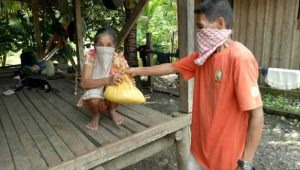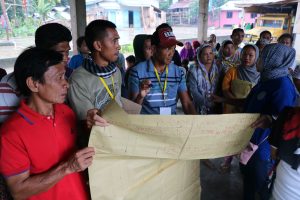Capturing learning from a Typhoon Odette Community-led Humanitarian Action

Purok Liaonan, Caob, Del Carmen, Surigao del Norte
Liaoyan as a project site was discovered by accident, or perhaps by chance. Hidden in a secluded lagoon off the waters of Siargao, you have to travel at least half an hour to reach this small fishing community, passing through the famous Del Carmen Mangrove Reserve. At 8,620 hectares, this mangrove plantation is considered by the Department of Environment and Natural Resources (DENR) as the largest contiguous mangrove forest in the Philippines, containing 27 out of the 70 mangrove species in the world.
It is thick and lush and conserves many of Siargao’s marine species. It also keeps hidden from sight few fishing villages, including Liaonan.
Renefe Padilla, ECOWEB’s SCLR Humanitarian Program Coordinator, recalled that they discovered the village by accident. They were going for a much-needed rest at the famous Sugba Blue Lagoon, a must-stop in the Siargao itinerary. They decided to might as well bring hygiene kits from Latter Day Saints Charities in case they would pass by an Odette-affected island community.
This is despite the fact that GMA News featured their story on January 5, 2022. The people were reported to have climbed the hill, and hid inside the caves to protect them from the waves and the strong winds. It was a steep climb, but they didn’t have much choice. One of them, the wife of Emelito Solma, died of hypothermia, her body succumbed to the cold.
From that vantage point, they saw how the typhoon wrought havoc on their small village.
It was obviously a traumatic experience for many. So when a focus group discussion was organized promoting survivor and community-led response approach (sclr), it became a storytelling activity. People simply gathered and wanted to share their experiences of surviving the worst time of their lives. December 16, 2021 for them will always be remembered. They were preparing for Christmas, but instead, a tragedy happened; not one house was saved. Many of them were convinced they would die.
Many of them told of the first four days after landfall. No one visited the island. They had no food or water. They mainly ate coconuts and whatever they could catch from the sea. All boats were damaged, so they couldn’t cross the ocean. All cellphone signals were down.
One mother narrated her experience feeding her children coconut meat instead of milk and how they all had diarrhea from drinking unsafe rainwater.
“It was so difficult, but we survived.” They said.
Four days later, someone repaired a small fishing boat. They took turns using that one to go to the mainland, report to their relatives, and buy provisions.
Their houses are makeshift and standing on stilts, covered mainly by a blue tarpaulin that showed signs of wear and tear. These are cramped in a tiny rock extension that provides less than a meter of space between the sea and the cliff. Walking along the tiny pathway is an exercise in balancing. The path is filled with sharp rocks and is not evenly distributed.
At night in the dark, it was a life-threatening foot walk. When ECOWEB distributed the solar lamps, their leaders insisted that each one should receive them. Everyone was vulnerable – a child, a PWD, a pregnant woman, a senior citizen. Each family has a vulnerable sector.
No. They said each one must have. So, they were happy when informed that ECOWEB decided to add to their allocation.
“Why don’t you build on this large beach area which is flat and safe?”
They were there in the beginning, it turned out.
“Mga dayo kami.” We are all strangers here, migrants from Siargao. This was a safe fishing lagoon with a beautiful beach. But years ago, a businessman who said he owned the beachfront told them to dismantle their homes.”
They said yes right away. “We are dayo, strangers here. We do not have rights.” Many of them said in chorus. “We should not be here if only we have options.”
Three months after landfall, the community remained in survival mode when the Community Led Response was introduced by ECOWEB, giving them access to a 100,000 cash grant. Their plans were not pushed through, they said lamentably.
They submitted a proposal for a piggery that would serve as alternative livelihood for the women while the husbands were still trying to repair their boats or buy a new ones with money from lending agencies.
Only one group was able to follow the plan. The rest had conflicts and eventually decided to distribute cash per family. “We have different needs. But some families pooled together their share and started their own piggery business,” said Mrs. Letecia Resota, who is a migrant from Leyte.
She said on behalf of the gathering, “We are still making decisions together, although we have different opinions and needs. So the community still decided even if we failed to implement our plans.”



